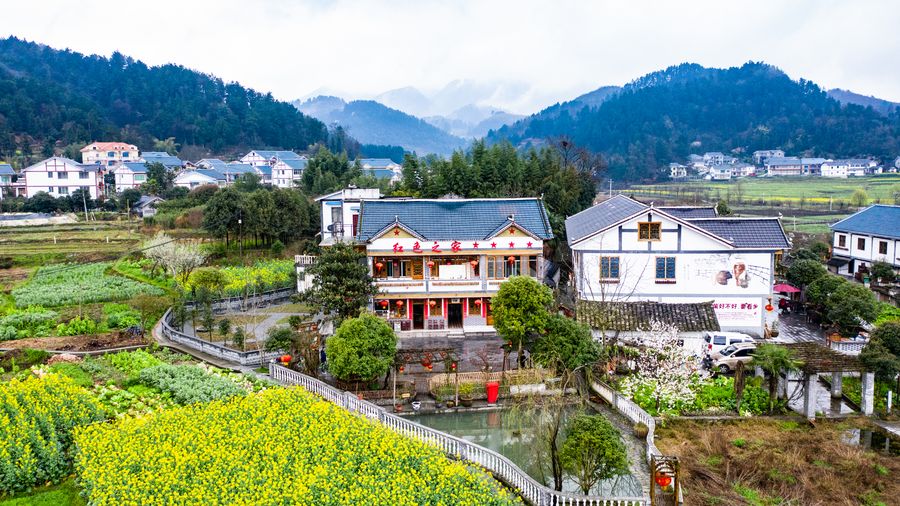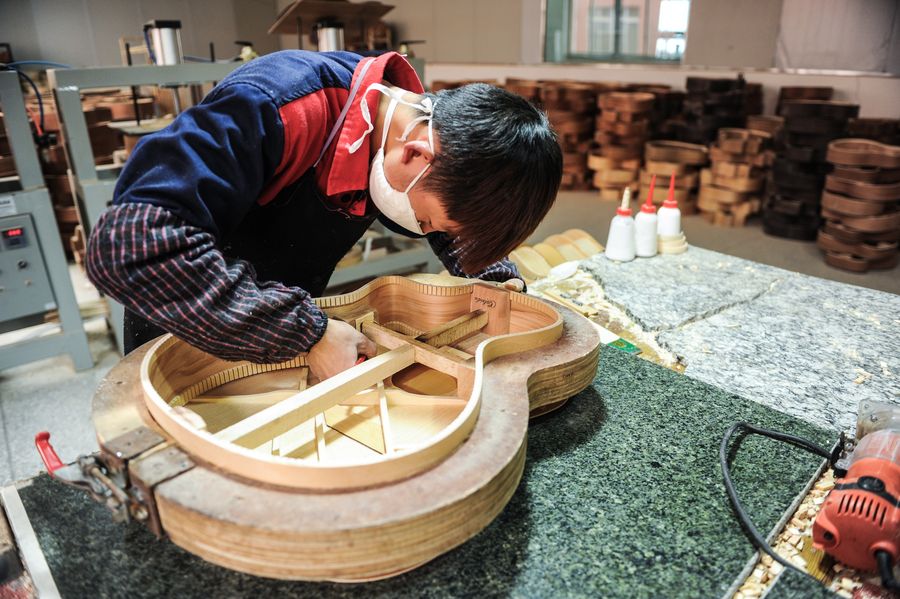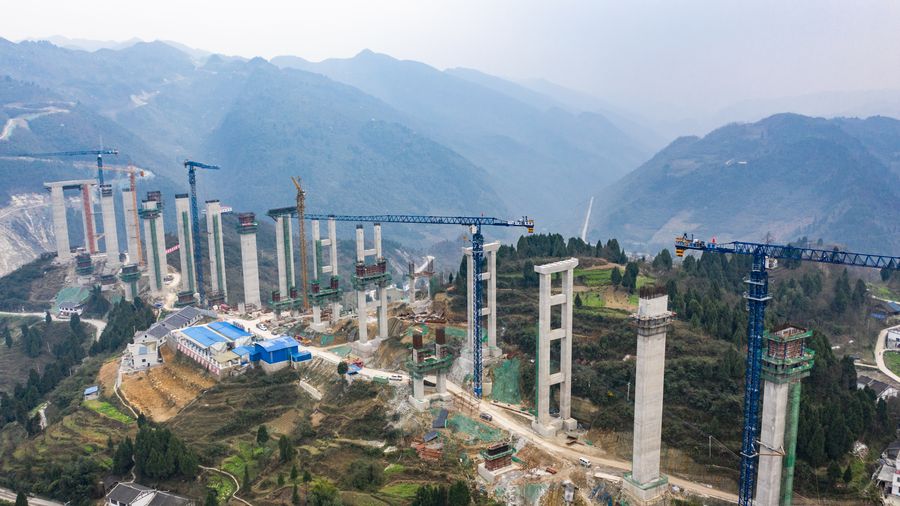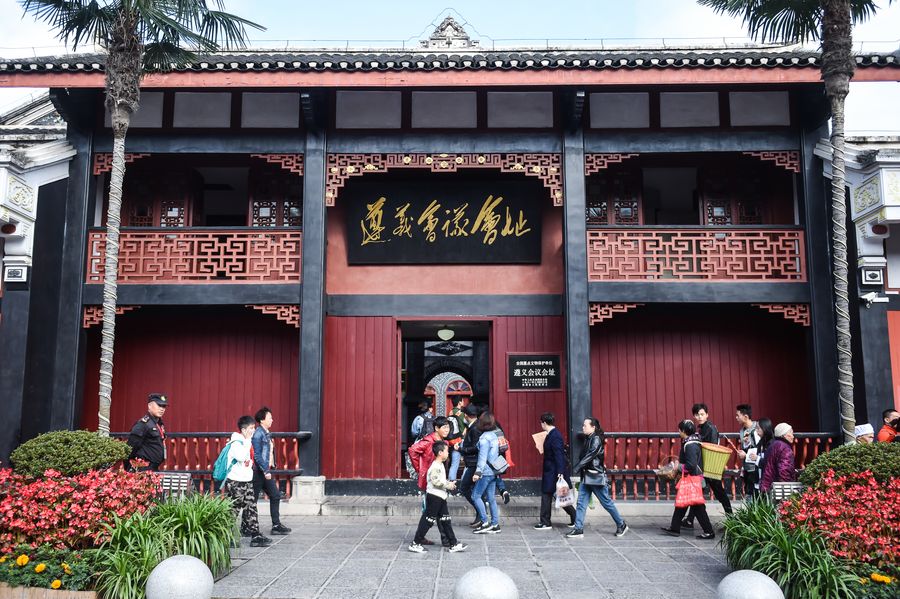Zunyi, a former revolutionary base of the Communist Party of China in southwest China's Guizhou Province, has cast off poverty.
Thanks to burgeoning industries, improving infrastructure and distinctive cultural tours, more than eight million people in Zunyi are living better lives.
By Xinhua writers Zhong Qun, Wang Li, Li Jingya and Liu Zhiqiang
GUIYANG, March 3 (Xinhua) -- Riding on the fast development of industries, improving infrastructure and distinctive cultural tours, a former revolutionary site of the Communist Party of China (CPC) has formally cast off poverty in China's southwestern mountains.
On Tuesday, the government of Guizhou Province announced that Zheng'an County in the province has shaken off poverty. The county is under the jurisdiction of the city of Zunyi, where the CPC conducted its early revolutionary activities. The announcement means that more than 8 million people in the entire city of Zunyi have officially bid farewell to poverty.

A view of Huamao Village of Fengxiang Township in Zunyi City, southwest China's Guizhou Province, Feb. 28, 2020. (Xinhua/Tao Liang)
Over the years, Zunyi has taken a variety of measures in answer to China's campaign to eradicate absolute poverty in 2020.
Major industries such as guitar-making and tea plantations powered Zunyi's economic growth, while roads, water projects and the revolution-themed tourism also put the city, once mired in grinding poverty, on a fast track toward modernization.
GUITARS STRIKE A CHORD IN REVOLUTIONARY HEARTLAND
When Zheng Chuanjiu decided to build a guitar-making factory in Zunyi's Zheng'an County in 2013, he was a little nervous.
"There were no raw materials, and transportation was bad," said Zheng, 42. "But the county had advantages in land and labor and there was government support."
Zheng, a native of the county, had found success in the guitar industry in Guangzhou, capital of south China's Guangdong Province. He and his brother established the Guangzhou Shenqu Musical Instruments, a Guangzhou-based guitar-making company, after years of hard work in the southern metropolis.
"The county government of my hometown wanted to develop the guitar-making industry after they found many local migrant workers were working in the industry in Guangzhou," Zheng said. "They established an industrial park and we were the first to join."

An employee works at the workshop of Guangzhou Shenqu Musical Instruments, a Guangzhou-based guitar-making company, in Zheng'an County of Zunyi City, southwest China's Guizhou Province, March 28, 2017. (Xinhua/Tao Liang)
The government put forward a variety of preferential policies in rents, financing and taxes, to support guitar-making companies like Zheng's and allow the sector to prosper.
Today, Zheng's company in the county has grown into one with an annual production value of more than 30 million U.S. dollars. One of the country's top five guitar makers, it employs more than 500 local farmers and more than 100 poverty-stricken residents.
Zheng's company is part of a bigger picture. The company's success has led many to jump on the bandwagon. After years of growth, the county is now home to 64 companies specializing in guitar-related fields, churning out about 7 million guitars a year to more than 30 countries and regions across the world and employing more than 15,000 locals.
The guitar industry forms part of the government's efforts to develop local industries. Thanks to geological advantages, the county also saw the emergence of tea gardens and traditional Chinese medicine plantations. All these sectors drove local economic growth.

A group of children trying tea-picking at Hetaoba Village in Meitan County of Zunyi City, southwest China's Guizhou Province, April 1, 2018. (Xinhua/Yang Wenbin)
BETTER INFRASTRUCTURE, BETTER LIVES
Given the mountainous landscape in Guizhou, authorities in Zunyi knew the importance of improving infrastructure projects if they wanted to bring the local economy to the next level. So they started building new roads to facilitate transportation.
Last year, Guizhou built 8,116 km of roadways. The Guizhou provincial government spent 29.34 billion yuan (4.2 billion U.S. dollars) building the roadways, including 7,386 km in rural areas, according to the provincial highway bureau. The province also upgraded many old roadways.

The construction site of Tuanjie Grand Bridge of Renhuai-Zunyi Highway, which has resumed construction amid strict prevention measures against the novel coronavirus, in southwest China's Guizhou Province, Feb. 27, 2020. (Xinhua/Tao Liang)
In the county of Zheng'an, for example, several major highways not only enhanced logistics to bring specialties out of town but also allowed outside investment to flow to the county tucked in the lush green mountains.
"Thanks to improved transportation conditions, our guitars can easily reach many areas in the country and around the world," said Zheng Chuanjiu.
In Huanglian Village, rural family inns have mushroomed, as more visitors come as more roads were built. Many tourists come to enjoy the countryside scenes during the holidays.
In addition, water projects also began, bringing safe drinking water to local households.
"We used to depend on the weather for water," said Zunyi resident Zeng Fanyun. "Now we have clean water from the taps."
For areas deemed inhabitable, authorities moved people out.
Statistics show that Guizhou relocated 1.88 million people from inhospitable areas in 2019.
RED TOURS, GOLDEN OPPORTUNITIES
As many cities in China scramble to modernize and adopt the latest technology to power growth, Zunyi seems to have found a new way to develop itself by looking to the past.
In January 1935, an enlarged meeting of the Political Bureau of the CPC Central Committee took place in Zunyi during the Long March.
The meeting focused on rectifying the left-leaning errors in military and organizational affairs and established the correct leadership of the new Central Committee, as represented by Mao Zedong.
The Zunyi Meeting is regarded as a crucial turning point of the Long March, leading to the ultimate success of the Chinese revolution.
Since then, Zunyi has become a sacred place for generations of CPC members, and the footprints of the Red Army are forever imprinted on the city's culture and spirit.
Today, local authorities are promoting "red tours" in the locality, aiming to bolster the tourism sector as part of economic growth.

Tourists are seen at the Memorial of Zunyi Meeting in Zunyi, southwest China's Guizhou Province, Oct. 16, 2018. (Xinhua/Tao Liang)
Yang Zhirong started a family homestay in the county of Tongzi in Zunyi. The homestay is called "The Red Army Road Inn," because it is close to the command center of a famous battle during the 1930s.
"During the summer holidays, there are barely enough rooms to accommodate all the tourists," Yang said. "Because the Red Army used to walk near here, the visitors feel they could sense history by staying here."
Last year, Zunyi received more than 46 million visitors for red tours, generating a revenue of about 35.5 billion yuan, up 24.1 percent year on year, according to official figures.
The red tours also prompted sales of local cultural products, such as handmade soap, wallets and fragrances, all featuring Red Army themes. Forums, hiking and even marathons feature red themes as well in Zunyi.
"Zunyi serves as a good example of the CPC's ability and responsibility to help people live prosperous lives," said Zheng Dongsheng, a professor with the Party School of the Guizhou Provincial Committee of the CPC. "Zunyi's success to cast off poverty highlights the Long March spirit in the modern era."
(Reporting by Zhong Qun, Wang Li, Li Jingya, Liu Zhiqiang, Tao Liang and Yang Wenbin; Video reporters: Liu Qinbing, Yang Yanbin and Li Haiwei; Video editor: Yang Zhixiang)■



